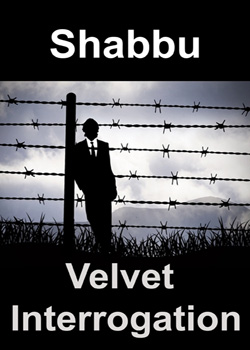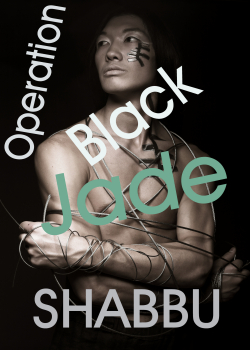Espionage and Gay Romance in the Middle East.
U.S. diplomat Chet Bender saves young Nabil Shabili in an extraction from Palestinian refugee camps inside Lebanon, in the shadow of an impending Israeli attack that will lead to a massacre in the camps. He subsequently accepts Nabil into his life, bed, and heart. Nearly twenty years later, Nabil is in the running to take the presidency of Lebanon and the forces promoting this rise are busy cleaning up loose ends in his past. And one of those loose ends is Chet.
This is an expanded relaunch of Shabbu’s The Interview.
REVIEWS of the original The Interview:
Rainbow Reviews 5 stars
This story is fascinating complex, set against an all-too-believable historical backdrop. . . . Against this backdrop, the contrast of Chet and Nabil’s love for each other shines through, a love strong enough to make the protection of the other man of primary importance, more important even than being together.
From Dark Divas 5 Divas
If you enjoy an intellectual story, if you like mysteries, if sizzling sex tempts you, then I have a recommendation for you: Shabbu’s The Interview will nicely fulfill any and all of the above requirements and entertain you as well.

I stopped there, not wanting to delve deeper into this, damning myself for creating the opening. How could I tell him that—against all of my instincts to harden my heart to the young men milling around and looking threatening—I was attracted to Nabil from the start—by his striking good looks. His beauty, actually. Somewhat androgynous then, when he was not more than a teenager. He would have been beautiful no matter what sex he was. That was then, of course. Later he grew in stature and commanding musculature and hardened up into a handsome, masculine man. Always the sort of engaging personality that served him well in what he has become. How could I tell Moorhead that I was immediately attracted to Nabil in a way that none of the other Palestinian refugees affected me—that, immediately, I was concerned for him; didn’t want him to suffer what I knew was coming from the Israelis?
I rushed on, protecting myself from what Moorhead could have asked that would open the Pandora’s box of this interview.
“‘Who believes the Israelis?’ Nabil answered me. His tone was sarcastic, and for a moment I was afraid that he was egging that muttering group of other men milling around outside the bus to start trouble. I told him that I did—I mean that we, at the U.S. embassy did.
“Nabil asked me why. And I told him that it was because the Israelis usually did what they say they would do. He looked at me for a moment; then he left. But as I was getting ready to leave, still with two empty seats, he came back with a backpack and said, ‘I am going with you.’ I wasn’t sure I could get him past the checkpoints. I didn’t have permission to take any young man—men his age were the targets of the Israeli action that was to come.
“I paused for a moment, but he repeated, insistently, ‘I am going with you.’ I grabbed his backpack and told him to open it. He looked at me as if he wouldn’t; then he did, and it was just clothes. And some books, in English. So, I decided he didn’t want to get on the bus to cause trouble. And I took a risk. I had papers to cover two young women. So, I looked around on the bus for a woman of his stature—Nabil wasn’t tall, and he was thin. I had him dressed quickly in woman’s clothes. Credit to the others on the bus, not one of them objected to my trying to save a young Palestinian man. We managed to get through the checkpoints without any of the soldiers taking notice of him.”
I expected Moorhead to pursue my motivation for taking such a risk for a young man, and I was prepared to say that I had the two empty seats, I wanted to save as many as possible, no one else was showing willingness to go, and it was time we had to leave, so at that point I was willing to do anything to save another life. But Moorhead just smiled at me and moved on with his questions.
“You reached Beirut.” Moorhead asked in a low voice, almost a monotone. “Was that a difficult journey? And then what happened? Nabil wasn’t on your original list, was he? So, you didn’t know Nabil at all before that time. And yet your association with Nabil doesn’t end there, does it? It’s a long way from a refugee camp to the University of Virginia; to Washington, D.C.; and back to Lebanon. And here we have Nabil campaigning for the presidency in Lebanon—and very likely to win. So, this is a pivotal story in his rise to prominence, isn’t it?”











